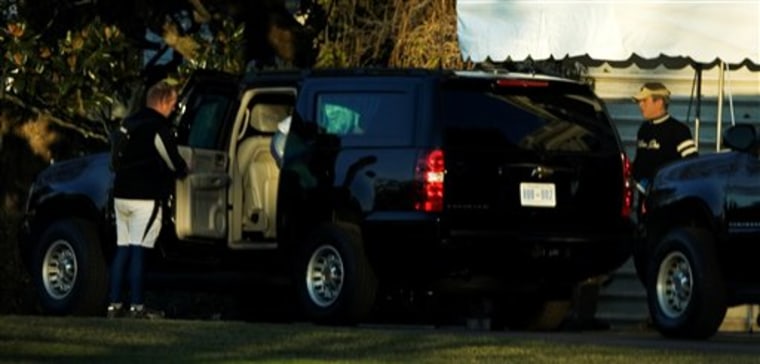The White House said Sunday it does not expect to make an announcement by Monday on a possible plan to prevent the collapse of the troubled auto industry.
The Bush administration is considering ways to provide emergency aid to General Motors Corp. and Chrysler LLC, which have said they could run out of cash within weeks without government help.
White House officials said they did not expect an announcement on any funding for the companies on Sunday or Monday. President George W. Bush made a surprise visit to Iraq on Sunday.
The aid probably would benefit General Motors and Chrysler. Ford Motor Co. has said it has enough cash to survive 2009 but asked Congress for a line of credit in case financial conditions deteriorate.
GOP Sen. Bob Corker of Tennessee, after speaking with the White House early Sunday, said, "I don't think they yet know what they are going to do." Ron Gettelfinger, the president of the Unietd Auto Workers union, said the union had not held discussions with the White House.
Last week, Congress failed to approve $14 billion in loans to help the automakers. The plan would have provided short-term financing to the industry and create a "car czar" who would ensure that the money would transform the Big Three into competitive companies.
In the aftermath of the legislative defeat, administration officials have said they are considering several options, including using money from the $700 billion financial bailout fund to provide loans to the carmakers.
Corker said Treasury officials were reviewing the companies' balance sheets, but "both Chrysler and GM are on the verge of bankruptcy, just a few days away."
Corker and other Republicans sought a compromise that would have insisted the carmakers to restructure their debt and bring wages and benefits in line with those paid by Toyota, Honda and Nissan in the United States. The legislation died when Republicans demanded upfront pay and benefit concessions from the United Auto Workers that union leaders rejected.
Corker urged the administration to seek similar concessions from the auto companies and their unions in return for the money. "Of course, the benefit they have — they don't have to negotiate. They can say this money is available but it's only available under these conditions," he said in a broadcast interview.
Asked whether the deal was intended to break the UAW, Sen. Debbie Stabenow, D-Mich., said Republican leaders in the Senate did not want an agreement. She said the loans were needed to buy time for the companies to restructure.
"Manufacturing is on the edge in this country. This is not the time for a political agenda," said Stabenow.
The UAW's Gettelfinger said the failure of the legislation showed that Congress should stay "away from the bargaining table."
"The bargaining issue should be handled by the companies and the union," Gettelfinger said.
The administration has several options. It could tap the $700 billion financial rescue bailout fund to provide loans to the carmakers or use part of that fund as a kind of collateral for emergency loans the automakers could get from the Federal Reserve.
The administration also could do nothing, leaving open the possibility that one or more of the automakers could go bankrupt. But White House press secretary Dana Perino said Friday a collapse of the auto industry would have a "severe impact on our economy," and it would be "irresponsible" the destabilize the economy.
The White House is keeping President-elect Barack Obama and his advisers informed of the discussions. If administration officials choose not to provide the money now, the Obama team could wait for the new Congress, which will have stronger Democratic majorities.
Providing aid to the companies could represent a change for the White House, which has previously insisted that the Wall Street rescue plan enacted in October should be used solely to help financial institutions.
Gov. Jennifer Granholm, D-Mich., said Sunday other countries were providing aid to their automakers and the loans were essential to help make the U.S. less dependent on Middle Eastern oil.
If the companies don't get help, "we'll be replacing our reliance on foreign oil with a reliance on foreign batteries because it's going to be the battery that's driving the electric vehicle in the future," Granholm said on NBC's "Meet the Press."
Former Gov. Mitt Romney, R-Mass., a Michigan native whose father, George Romney, served as chairman of American Motors, said he supported the decision by Congress to reject the efforts of the auto chief executives for the federal help.
"They basically came to Washington and said give us a check so we can continue to fund business as usual," Romney said.
Corker was on CBS' "Face the Nation" and "Fox News Sunday," where he appeared with Stabenow. Gettelfinger was on "Late Edition" on CNN.
